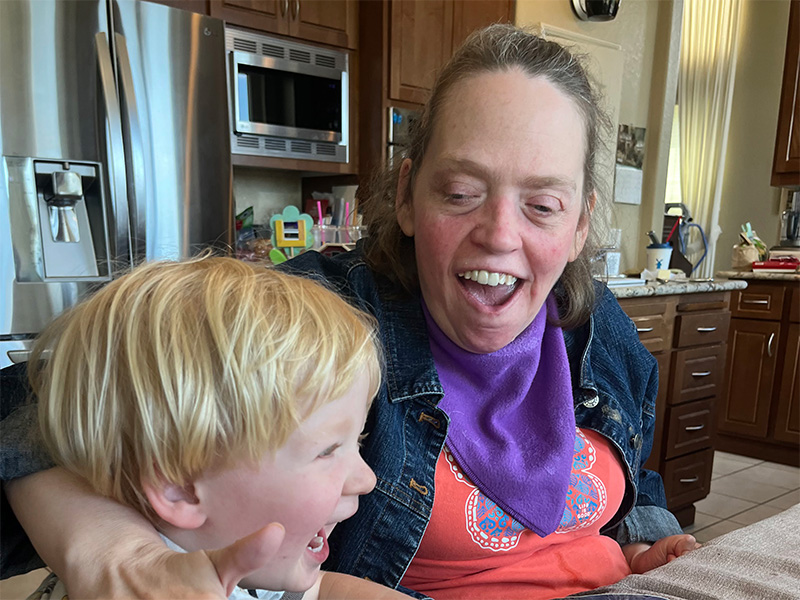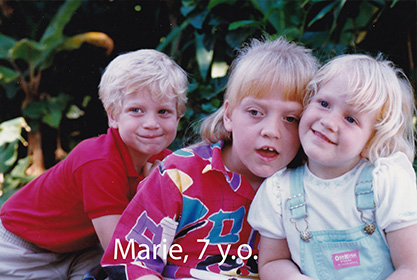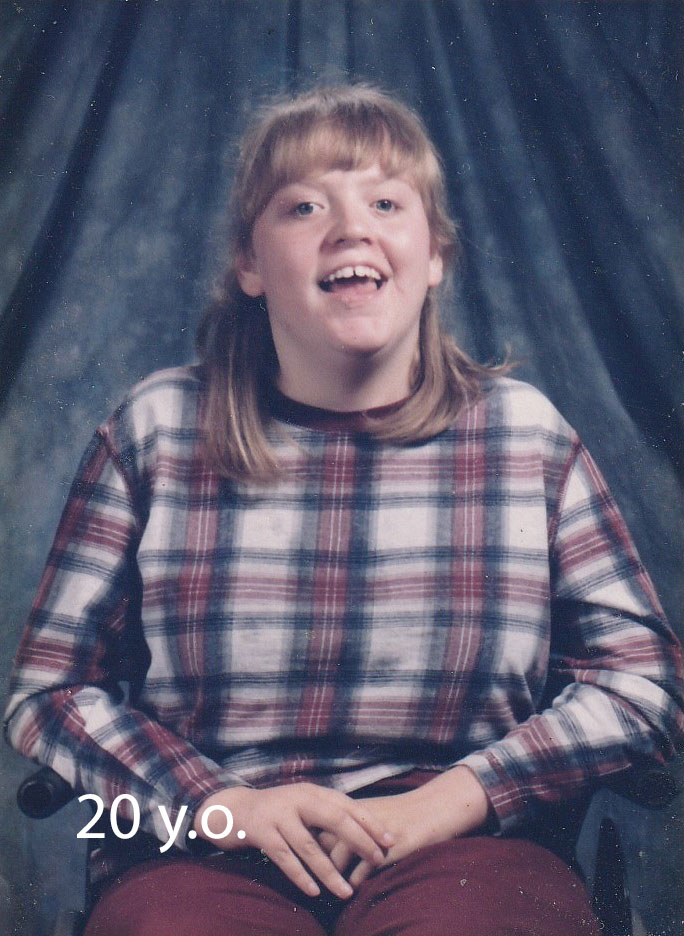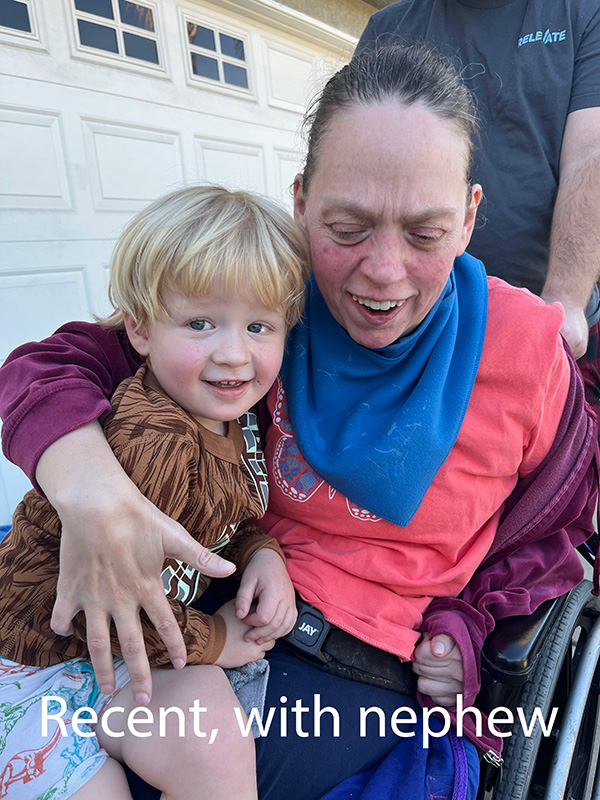
Marie
This is the English version, you find the original version below
Marie was the first child my husband and I welcomed into our family (born 1980). That was over 44 years ago, so we have a long history to share.
First of all, it must be said that it is not easy to raise a person with special needs, but Marie has brought us much joy over the years, as well as tears. We later had a son and a daughter after Marie, who developed typically. Not long after her birth, developmental delays became apparent. She was a “floppy baby” with poor muscle tone and intermittent nystagmus (rapid side-to-side eye movements). The medical and neurological workup at Children’s Hospital in Kansas City (where we were living at the time) was unrevealing. A diagnosis of “cerebral palsy” of an unusual type was the best diagnosis. Not surprisingly, Salla Disease was not considered, as it was only first identified in 1979, and she was born in 1980.
With time, her intellectual and physical impairments became more apparent. Eventually, it was clear she would not be able to walk, and her speech was very limited. After various carts and wagons, her first real wheelchair was a stark reminder to us of her physical limitations. In 1988, we moved back closer to our home roots of southern California (San Diego). Fortunately, California offers good support services for children with disabilities, and we enrolled her in a school district with appropriate special education programs. The San Diego Regional Center (a state organization) has provided Marie with a variety of services over the years, including respite care in the home. Currently, they provide case management and substantial financial support for Marie in her group home and a day program with the non-profit organization, The Arc.
After caring for Marie at home for about 35 years, we realized this was becoming untenable as we got older. Thus, after a long search, we found a home that was a good match for Marie; she moved in at the age of 37 in 2018.
What does Marie like to do? More than anything, she loves being with family, friends, and close caregivers. Babies, young children, and dogs are special favorites. She LOVES being with her 3-year-old nephew. During a recent trip to the Zoo, she enjoyed seeing the giraffes, but I think she had even more fun oohing and ahhing when we passed by the babies and young children! She loves music, most Disney movies, Scooby Doo, and some TV shows. Cheeseburgers and Diet Coke are her favorite foods. She loves to go shopping and has a long reach with her arms to grab items from the shelves.
We are always proud of Marie when we participate in her regular progress reports. She is always described as friendly, sweet, and enthusiastic. In fact, her loving, endearing personality (a common characteristic with Salla) is one of her greatest assets. Her caregivers get very attached to her, which enhances her care. Even her housemates tell us they are “taking care” of her. Although her speech is limited, she makes her opinions known—she says “yuck” to food she doesn’t like and will try to wheel herself out of the theater if she doesn’t like the movie, despite Coke and popcorn!
For many years, we did not have a specific diagnosis for Marie’s disabilities other than “cerebral palsy.” We wondered whether it was a preventable pregnancy or birth-related injury, etc. However, in 2021, when our younger daughter, Sarah, became pregnant, routine (nowadays!) genetic screening revealed she was a carrier (asymptomatic) for Salla Disease. We had never heard of Salla Disease, but when we investigated it, Marie’s disability seemed to be a possible fit. Both my husband and I have close Swedish and Finnish heritage (Salla Disease was first described in northern Finland). In addition, the clinical descriptions, though limited, seemed like some of Marie’s, especially the friendly, loving personality. We found information about the STAR (Salla Treatment and Research) organization and spoke with Jessica Foglio. This eventually led us to have Marie seen by Dr. Raymond Wang at the Children’s Hospital of Orange County in 2022, who studies lysosomal storage diseases, such as Salla. Marie’s clinical picture fit, and an oral mouth swab confirmed that Marie, indeed, has Salla Disease. Finally, after 42 years, we knew the definitive cause of Marie’s disability! On one hand, it is a relief to know that it was not a pregnancy or birth-related injury that might have been preventable.
On the other hand, although the course is not well known since it is rare (and likely underreported), it is usually progressive later in life. We have noticed some subtle progression in the past few years, and her long-term prognosis is uncertain. Nevertheless, having a definitive diagnosis has been particularly important to us. Although we know it will not help Marie, we remain optimistic that, in the long term, there may be a curative treatment for Salla Disease and other lysosomal storage disorders.
From our experience with Marie, we would encourage parents of children with any disability to seek out whatever help is available from schools or government agencies. Family can also be a great source of care and support. Diane’s parents were very devoted to family and provided much-needed respite, support, and encouragement to us over many years. Our son, Eric, who lives nearby, often meets us for lunch with Marie or helps us get her in and out of her wheelchair or the lift van when we travel. Accept help when it is available or offered. Notably, between the Regional Center, Social Security (as my husband is over 65), and Medi-Cal (Medicaid in other states), the costs of her group home, day program, and healthcare are covered.
We remain on a journey with Marie. We try to ensure she has as full and enjoyable a life as possible. The excitement Marie has when she sees us never gets old and brings a special joy to our hearts!
Diane and Rick Hanson







